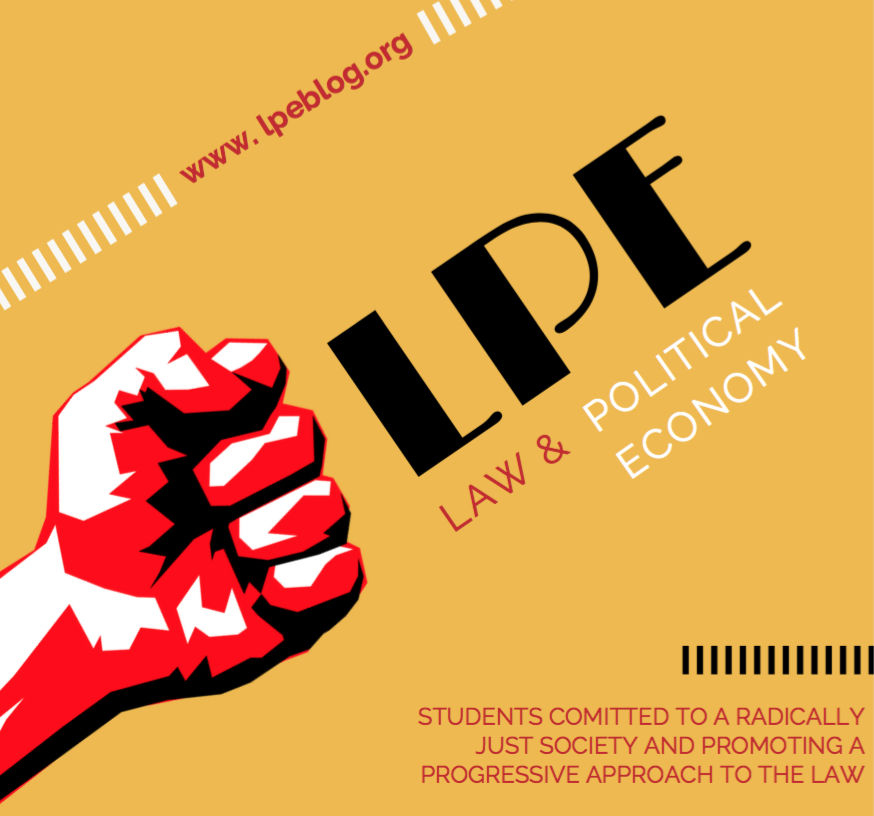This post continues our series featuring efforts to organize LPE student groups at several law schools. You can read the rest of the posts here.
 Why do people who believe in a more just, egalitarian society go to law school? Some of us hope to learn how the law can be used to disrupt the status quo. At the very least, we hope to get the training that will let us “uphold the law” which, in theory, protects the marginalized.
Why do people who believe in a more just, egalitarian society go to law school? Some of us hope to learn how the law can be used to disrupt the status quo. At the very least, we hope to get the training that will let us “uphold the law” which, in theory, protects the marginalized.
Unfortunately, for students like us, those first weeks in law school can be deeply alienating and disappointing. We learn to “think like a lawyer” in a classroom shaped by decades—if not centuries—of doctrine favoring the rich and powerful. Very quickly, students are introduced to Law and Economics, which is presented not as a jurisprudential fashion or ideology, but as the inevitable, rational, scientific answer to what law must be in a modern society. In classrooms where “efficiency” is elevated over fairness, how could students committed to a democratic society not feel out of place? Students who believed that law might be a tool for achieving social change quickly learn that the law itself stands in the way of a more just future.
Instead of becoming disillusioned with the law, several students at Penn Law chose to join a movement to question the dogmas presented to us. We started Law Students for a Democratic Society—what we’ve named our campus LPE group—to cultivate humanistic, politically conscious, radical lawyering at Penn Law.
There are many public interest students at Penn, but the realm of what constitutes “public interest” can be needlessly circumscribed. Believing that their time is better spent elsewhere, many students avoid the “private” fields of law like property, antitrust, or bankruptcy. Penn has profound commitments to these fields of law, to the Wharton School, and other institutions of global capital. For that reason, it’s absolutely essential that we present an alternative vision of what the law can be.
Our first project has been organizing the “Disrupting Doctrine” series—a set of lectures offering critical perspectives on all of the classes in Penn’s first-year curriculum: Contracts, Torts, Civil Procedure, Criminal Law, and Constitutional Law. This series, inspired in part by alternative curriculum projects undertaken by members of the LPE Student Network, is part lecture, part organizing: we want to help students identify the ideological assumptions in their doctrinal courses, while simultaneously building a community of like-minded future lawyers.
In our first lecture of the series, Professor Sanjukta Paul presented a radical, alternative vision of the first-year Contracts course. She challenged the mostly 1L audience to find the role of the state in supposedly private transactions by asking, “Why does the law selectively ‘see’ and disfavor certain forms of economic coordination while selectively naturalizing others?”
Tara Ramchandani, a civil rights litigator with the firm Relman, Dane & Colfax, offered our second lecture on October 29, covering Torts. She reminded us of the immense difficulties plaintiffs face when challenging the powerful interests that are responsible for so many social and economic harms, and prompted students to consider how torts doctrine frames systemic harms as disputes between two actors. Next month, Frank Deale, a professor at the CUNY School of Law, will lead our discussion on Civil Procedure.
We hope these lectures give 1L students ways to engage the first-year curriculum with their values intact. Instead of disillusionment, this project brings us hope: we’re building a community of lawyers committed to defending democracy.
If we ever hope to harness the true democratic potential of the law, we will need to challenge old assumptions. We will need to intervene in fields of law that “public interest” students are discouraged—often deliberately—from pursuing. But most importantly, we will need to build a movement.



